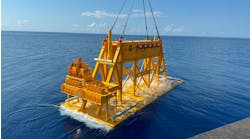The United Kingdom continental shelf (UKCS) faces a crisis, along with the rest of the industry worldwide, and needs adjustment and regrouping. The UKCS has long been a haven for exploration and production. The industry benefits from political stability, a generally fair and flexible regulator, and usually, fiscal parity with other parts of the world.
But, the industry is beginning to see so many changes in the flags flying over company offices, mergers, takeovers, and exits, that the future seems uncertain.
Is it a simple cost issue? Is the UK more expensive than other countries or has the UKCS run out of yet-to-find reserves? Is the UKCS close to extinction, or does it have a long-term future? Let's examine the issues.
Current situation
In 1999, there will have been about 33 exploration and appraisal wells drilled, significantly less than in 1998. If forecasts are close to accurate, there may be even fewer in 2000. Even those planned for 2000 are subject to partner approvals. Development funds seem to be the only success story at the moment.
Year 2000 budgets are likely to show little or no improvement over 1999 budgets, a transition that seems to ignore the oil price recovery. Why does exploration activity remain low for the coming year? Do companies simply not trust the recovery in oil price or is there a fundamental change taking place in the shadows, hiding behind and using the recent crisis as a smoke screen?
It appears that most of the wells to be drilled in 2000 will be appraisals of North Sea discoveries or satellites to existing fields. Conoco uses the term "snuggle drilling" to describe this approach in which wells have to be low risk, close to infrastructure, and quick to production. Whatever an operator calls these wells, they are likely to dominate drilling activity for a while as partners push for low risks and early rewards.
Exploration drilling in the North Sea remains in the doldrums, even after several initiatives have been undertaken over the past year to help the industry and rig rates have been reduced drastically.
Atlantic margin
The outlook is rather different on the Atlantic margin where costs remain higher than for similar frontier deepwater drilling activity elsewhere in the world. Risks also remain high and the lack of significant success, apart from BP's Foinaven and Schiehallion fields and distinctly limited scope for infrastructure, further dissuades investment.
There may be some hard decisions made over the coming year which could lead to conflict with the UK Department of Trade & Industry (DTI) over outstanding commitment wells. The risk of not being awarded White Zone acreage may prove to be no threat to a company that cannot obtain corporate approval for an existing prospect with an attached obligation well. Packing their bags and leaving the UK may appear to be the more cost effective move.
Industry and government walk a fine line in terms of obligation drilling and economic reality - a reality that has changed with the prevailing pressures to ensure a healthy sector. Industry welcomed DTI concessions announced in March of this year, but no one believed such concessions would be repeated endlessly.
Government does not want to scare away committed companies, but it has a role more important than upholding the official licence terms. Government's pressure on licence groups may prove essential in corporate soul searching, which may result in the fundamental restructuring of the UKCS business.
Minimum case well
What can technological advances offer exploration and production companies in the short-to-medium term? Many initiatives have faded during this downturn, due to failing research and development budgets. The joint UKOOA/Crine Double-the-Value-of-Wells project is well into Phases II and III, having already delivered on Phase I (the exploration finder well concept).
While not entirely new, the multi-disciplinary and multi-company team generated a UKCS model to challenge conventional exploration well design and planning processes. With support from the DTI, the idea of starting with a minimum case well, with no safety compromises and only adding elements when justified, has been adopted successfully by several companies. The adaptation has resulted in a 40% saving over traditional well costs. In the short term, this may allow a few more wells to be drilled for the same budget. In periods of severe restrictions, this is good news for the explorer and the drilling contractor.
New technology in drilling and production has become almost an expectation among explorers, so rapid have improvements been over recent times. Perhaps too much investment and progress was expected from the service contracting industry, when exploration and production (E & P) companies are so sparing with their own funds. However, it is the service companies' survival ticket, since only by cost-cutting innovations will E&P continue, even at its current sluggish rate.
Collaboration, as seen in the recent task force effort between service companies, E&P business, and government may be the savior, if only research investment can be kept focused and knowledge shared effectively. The newly formed Industry Technology Facilitator (ITF) has a crucial role to play in this respect, while LOGIC, the new industry supply chain organization, must continue to help all sectors remain competitive and cost effective.
Production hubbing
Beyond exploration, development projects in the future may benefit from the fact that production hubs do not have quite the stranglehold over small pool operators they had in the past, partly due to floating systems, but also due to the long distance tiebacks which can now be achieved even with relatively high-pressure, high-temperature fluids. Competition for throughput into aging systems, with ullage, may see a few small reservoir pools move to development, despite traditional tariff barriers. There is the prospect of moving field output directly to shore, avoiding tariffs altogether, a situation unheard of a few years ago.
Such opportunities remain limited and the voluntary code of practice regarding tariffs has certainly not solved everybody's problems. Whether intervention by government in commercial issues is justified for the national good has been debated before and could resurface as the race to capture early return on small fields accelerates.
Deepwater areas may have a few years to wait before gas can economically be brought ashore. Perhaps the BP statement on its possible line to the North Sea Magnus area was as much to flush out other parties with potential throughput, as to publicize their own studies. Control of the first infrastructure on the Atlantic Margin would certainly give the operator great power and be reminiscent of the early days of the Viking Graben.
Management change
So where do these many factors leave us in terms of understanding the future of exploration in the UKCS? Perhaps those with experience of Western Canada might recognize the signs and see major changes ahead.
There is a long term viable future for many UKCS traditional field areas. It is likely that the majors will control these field areas until they calculate that sale to a company such as Talisman or Kerr McGee will realize more value than continued production.
There are positive signs for those aggressive operators willing to take on the responsibility of aging fields and infrastructure. Talisman has been remarkably successful, perhaps because it has such a well-developed strategic plan with total management and staff understanding and commitment to achieve that goal.
Focus must be essential to avoid being drawn through every opportunity that comes along. If Talisman in the UK has reached the summit of Mont Blanc, in terms of success, there can only be an Everest ahead and then where? It will rely on their detailed strategic planning to find the next niche and to ensure the whole company knows and understand that target. This degree of focus may be difficult for many companies to achieve, but it is undoubtedly a highly valuable commodity. With a substantial number of producing fields in the UKCS, two significant events must occur to fully revitalize this sector:
- Major operators need to decide to divest their non-core fields and facilities where they find limited corporate support for activity.
- More companies need to face the challenge of becoming a field operator.
Not only would these steps release funds for the majors to reinvest, elsewhere if need be, but it would bring in new ideas, enthusiasm, and hope, which would also impact exploration efforts. For a variety of reasons, there are companies that are not devoted to the current hot spots around the globe for whom UKCS opportunities still rank highly. These companies should have the opportunity to invest.
John Brooks, the Head of Exploration and Licensing at the DTI, in speaking about the future of the UKCS, suggests that this could be a new beginning of activity in and around the UK, with much still to be learned and found. He is enthusiastic about exploration potential in complex areas, at great depths, and in under-explored acreage. At least one major believes there are even greater yet-to-find reserves in the UKCS than shown in the DTI's Brown Book.
Focus on size
Global producers require huge volumes to replace production. There are two ways of achieving success - focus on barrels and finding costs, or on rate of return (ROR) on investment.
Perhaps proving a new field of hundreds of millions of bbl in a remote part of the world catches headlines and satisfies shareholder expectations and for some years. BP, for example, followed this approach. To a large extent, the industry acknowledges that the North Sea is unlikely to produce many, if any, more giant fields, so a shift to the Atlantic Margin was predicted.
BP's success with Foinaven and Schiehallion caused them considerable difficulties as they tested the technical and economic limits of frontier developments. However, it also generated great excitement which, sadly, has waned as further exploration success failed to materialize. An alternative route to corporate success is to achieve a good return on investment, regardless of the volumes concerned. Most majors have traditionally rejected this second approach.
How many small discoveries with positive net present values have been languishing on portfolio books for years because the major didn't think it big enough to develop. It isn't just that the major carries greater corporate overhead costs, though that has formed part of the argument for years, it is at least in part habit. Big has been beautiful.
Some majors are struggling to reverse this trend, but so long as large opportunities are perceived in other part of the world, the view of one subsidiary is unlikely to shift the corporate attitude.
Smaller operators
This, then, forms the next opportunity for a long-term future. Somehow, the small discoveries and under-explored acreage have to find their way out of the major's portfolios and onto the open market. The recent spate of mergers and takeovers may force some majors to dispose of quite respectable opportunities, and provide real growth potential for the small-to-medium operators.
Perhaps the current lag in return to significant drilling activity after moderate oil price recovery is truly a reflection of companies on the verge of facing the fact that their future really is not in the UK.
Following acquisition of YPF, Repsol is now a million boe/d producer and has to focus its efforts. That it has faced its future and chosen to exit the UK is not a partial death knell for the UKCS, but of a great opportunity for rejuvenation. There are lessons to be learned by would-be new entrants as well as potential operators. Close scrutiny of the strategies of successful operators, such as Talisman, Enterprise, and others, may form a worthwhile exercise for larger companies intent on launching their companies in new directions.
Some opportunities may be technically challenging, so it may be time to revitalize service sector alliances, this time alongside medium-sized operators, not just the multinational E&P companies. This could represent a vast opening, if some companies can forge trust and understanding of exploration risk combined with technological ingenuity.
Moving projects forward
The DTI's Fallow Initiative was an attempt to recycle acreage, but it should be pursued more rigorously. A senior exploration workshop earlier this year strongly supported the Fallow Initiative as one way of encouraging activity.
Not that all partners necessarily want to sit on their acreage.
Non-alignment of licensees has long been a significant block to developments. The Andrew project, one of many examples, taxed everyone's imagination for a long time. Companies with drive and energy have worked enormously hard to forge like-minded groups to move projects forward.
Time is critical and lengthy delays just provide further excuses for not making a decision to develop. Recognition of this problem led the Task Force Regulation and Licensing Group to encourage evolution of the LIFT web site, a "virtual" trading floor for acreage acquisitions and disposals. The site will be live from November 1st 1999 with world-wide free access on www.uklift.co.uk.
But, maintaining a healthy E&P sector is not just the responsibility of industry. The importance of CGT rollover relief, announced by the UK government earlier this year, was welcome and will have an impact in due course. However, other measures are urgently required to ensure the longevity of older fields and hence allow for the full exploitation of their ever-enlarging catchment areas.
A strong case has been made for fiscal reforms that reflect the mature nature of much of the UKCS and progress in this area may prove as critical to producers' long term survival as efforts to realign.
Change is always disruptive and often painful, but the UKCS has vast potential, with both the skills and energy to take advantage of it. The oil industry is global and the UKCS can benefit from new entrants and new skills. Medium sized companies should take a more significant role, forming like-minded alliances, and see change as an opportunity, not a threat.
Editor's Note: The foregoing is a personal view of Christine Jones, who is Chairman of UKOOA's (UK Offshore Operater's Association) Exploration Committee.


